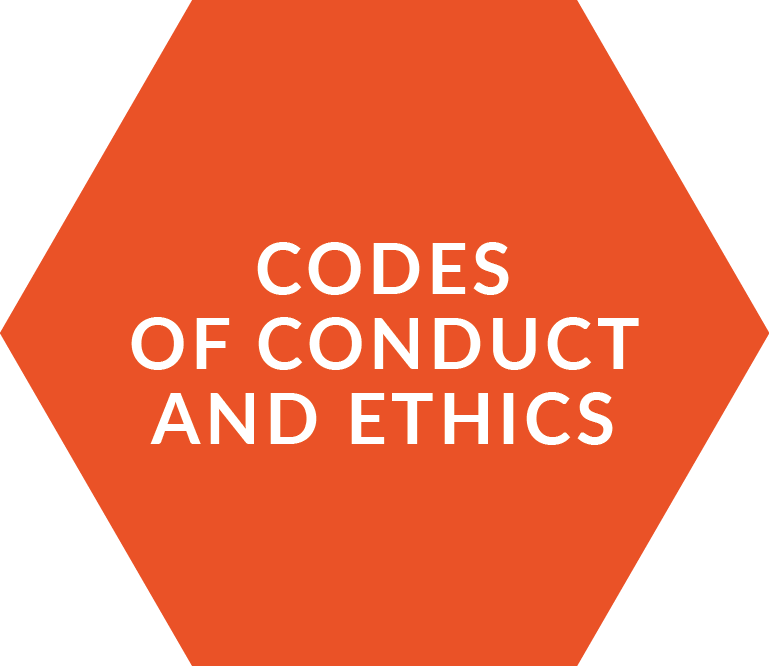UK Police Code of Ethics: The UK police have a Code of Ethics which all officers must abide by. It lists a number of standards of professional behaviour one of which is Confidentiality, which explains that police officers must ‘treat information with respect, and access or disclose it only in the proper course’ of their duties. The code includes guidelines regarding the handling of information and personal data, and the use of social media. However, there are no other guidelines regarding engaging with collaborative information management. If a member of the public feels that the police have breached this code, they can make a complaint via the police website and/or the Independent Police Complaints Commission (IPCC). The IPCC collects complaints and makes that data publicly available. This data is also used in reviews of police performance and how to improve the police forces.
ICRC 2013 Professional standards for Protection Work: The ICRC was one of the first to establish a code of conduct that includes discussion of sensitive data. It focuses on protection work carried out by humanitarian and human rights actors in armed conflict and other situations of violence, but includes more generally useful guidance on what to be aware of and how to manage sensitive data, including chapters on Collecting information from afar: understanding the risks and advantages linked to new technologies and methodologies, Preparing interviews and ensuring informed consent and privacy, Cooperation and exchange.
Social Media Data: People affected by risks and disaster, volunteers, volunteer organisations and others are increasingly turning to social media as they both seek but also generate information. Guidance and codes of conduct to address the challenges and opportunities arising at this juncture are starting to emerge. Examples of such efforts are the collaboration between the mobile industry and the humanitarian sector titled ‘Towards a Code of Conduct: Guidelines for the Use of SMS in Natural Disasters’ (GSMA, 2013) and the IFRC’s guide who together with ICRC and with the support of OCHA published in 2017 a guide on ‘How to Use Social Media to Better Engage People Affected by Crises’ (both available in Resources).
Resources
Büscher, M., Liegl, M., Wahlgren, P. (2013). Ethical, Legal and Social Issues: Current practices in Multi Agency Emergency Collaboration. BRIDGE Project Deliverable 12.2 [Link] (Contains reviews of some codes of conduct, as well as discussion of the concept of codes of conduct)
Crawford, K., Faleiros, G., Luers, A., Meier, P., Perlich, C., and Thorp, J. (2013). Big Data, Communities and Ethical Resilience: A Framework for Action. The Rockefeller Foundation [Link]
Gotterbarn, D. (2009) ICT Governance and What to do about the Toothless Tiger(s): Professional Organizations and Codes of Ethics. Australasian Journal of Information Systems. 16: 165-184. [Link]
GSMA. (2013). Towards a Code of Conduct: Guidelines for the Use of SMS in Natural Disasters [Link]
IFRC (2017). How to Use Social Media to Better Engage People Affected by Crises [Link]
International Committee of the Red Cross. (2013). Professional standards for Protection Work. [Link]
Petersen, K. and Büscher, M. (Eds) (2017). ELSI Guidance for 21st Century Networked Crisis Management. SecInCoRe Project Deliverable 2.7 [Link]
Prasad, A., Green, P. and Heales, J. (2013). On Governing Collaborative Information Technology (IT): A Relational Perspective. Journal of Information Systems. 27(1): 237-259. [DOI]
Pye, G. and Warren, M. J. (2006). Striking a Balance between Ethics and ICT Governance. Australasian Journal of Information Systems. 13: 201-207. [DOI] [Link]
Shanley, L., Burns, R., Bastian, Z., and Robson, E. (2013). Tweeting up a Storm. The Promise and Perils of Crisis Mapping. [Link]
Transparency International, Ethics [Link]
UK College of Policing (2014). Code of Ethics [Link]
UK Independent Office for Police Conduct (IOPC) [Link]

